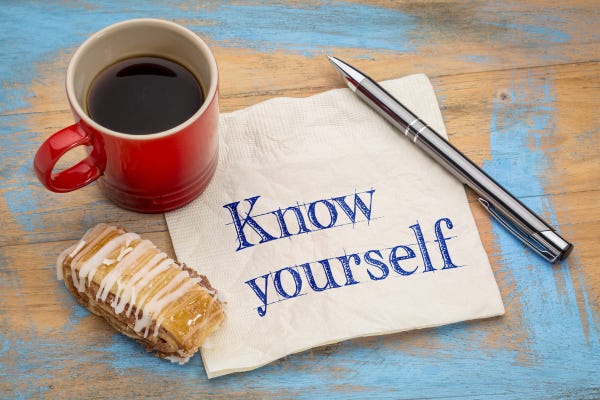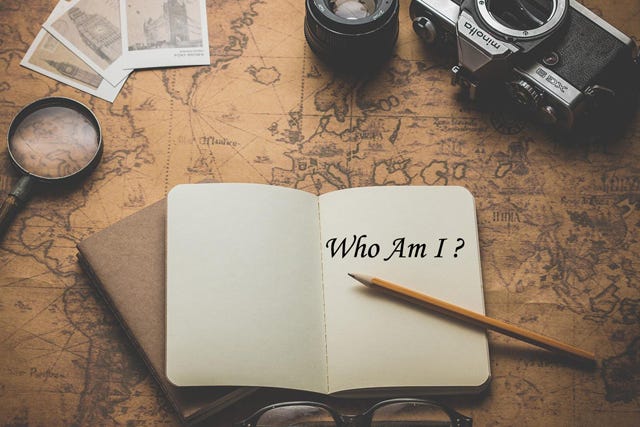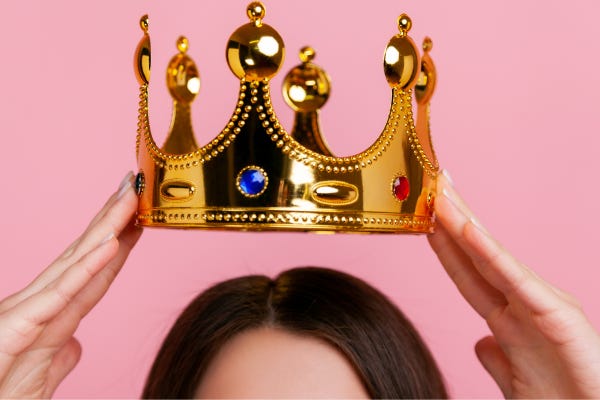How To Know For Sure Your Mother Is A Narcissist
From the desk of a self-proclaimed narcissist not close to retirement, I feel I can be an expert on the subject when it comes to family estrangement.
Hello Enlightened One,
The term "narcissist" gets thrown around more than a beach ball at a summer barbecue, especially when it comes to family estrangement. Adult children label their parents as narcissists, parents apply the term to entire younger generations, and the social media therapists appear to be leading this narrative.
I’d like to offer a fresh perspective on this label and its character traits. Perhaps, with a deeper understanding, we can open our hearts and minds and embrace a change in perspective.
(For those who prefer a quick overview, feel free to scroll down to the bottom for the Key Takeaways and Quick Summary that summarize the main points of this exploration.)
Full disclaimer: I have been a narcissist so many times in my life, and most days, I don’t feel close to retirement, so I feel I can be an expert on the subject. So, stick around while I explain myself and try to charm you into seeing things my way because, let’s be honest, who better to explain this to you than a self-proclaimed narcissist?!
To begin this shift in understanding, exploring the distinction between the authentic Self and the ego self is helpful - two aspects of identity that shape how we perceive ourselves and others.
In spiritual texts, a capitalized 'S' refers to the higher or authentic Self, while a lowercase' s' denotes the ego or narcissistic self.
So, let’s get ready to unravel this identity conundrum - because if there’s one thing we can all agree on, it’s that understanding ourselves is way more effective than arguing about who’s the bigger narcissist in the online forums, and who knows - maybe someday we can all hug it out and bridge the divide?
The Authentic Self: Your True Essence
The Authentic or Higher Self is the true, core, and genuine aspect of your identity. It represents who you are at your deepest soul level, beyond societal expectations, conditioning, and external influences.
It is often associated with being in touch with your true values, beliefs, and desires. It is a state of Self-awareness that allows you to live in alignment with your inner truth.
Achieving authenticity involves self-discovery and self-acceptance. It means being honest with yourself about your strengths, weaknesses, desires, and insane thoughts and beliefs, and the most challenging part is integrating this into your personality and being consistent.
Operating from this level of consciousness enables you to see and honor others with the grace you would want another to afford you. In its simplicity, encapsulated in a single word: Namaste, which means, "The divine in me honors the divine in you." This mutual respect is the foundation of always accepting one another, warts and all.
The Ego and the Narcissist: The Disconnect Between True Self and Persona
The ego self, by contrast, is closely tied to the self-image we project to the world. It is shaped by external factors such as societal norms, cultural expectations, and the desire for approval and validation, including the ego's favorite remediations like the new age validation therapy.
The ego can lead to a false sense of identity and may cause you to act in ways that are inauthentic in order to protect your self-image or to gain social approval. In today’s online culture, where selfies and highlight reels dominate, it’s easy to get caught up in projecting a perfect life. We scroll through feeds filled with sun-soaked vacations and flawless selfies, often feeling like we’re the only ones struggling. The ego can create a false sense of identity, leading us to act inauthentically just to protect our self-image or gain social approval. Remember, true authenticity is about embracing the messy reality of who we are…because nobody’s life is as perfect as it looks on Instagram.
The ego can create a disconnect between your true Self and your external persona, often leading to inner conflicts and unhappiness.
Operating from this lower level of consciousness often means viewing others through a harsh lens of judgment, reducing them to a single label: "The Narcissist," which implies they’re just self-centered or egotistical. But here’s the kicker: if you see this trait in someone else, it’s often a reflection of something within you - ouch! That realization always snags me.
The Authentic Self vs the ego self
The concept of the authentic Self versus the ego self can be understood as two different aspects of an individual's identity, and this contrast is not just essential for self-awareness and Self-reclamation, but also empowers you to heal and take control of your life.
Life mirrors what’s within us, not to punish or reward but to help us grow, heal, and align with our soul’s purpose (which is just a fancy way of saying, “Just be nice”). By observing what life reflects, whether joy, frustration, love, or pain, we gain insights into our inner world and the opportunity to make changes that can shift our external reality.
Essentially, the authentic Self is about being in touch with your true values and living consistently (in the world - with others) aligned with your soul’s innate reality…which is love. At the same time, the ego self, with its focus on external appearances, validation, and conforming to societal norms, is the architect of the walls we now call “boundaries”.
When My Ego Abducted Me and I Was A Narcissist
When my daughter went no contact and stopped talking to me, I found myself devastated, hurt, and mad as hell! How dare she ignore me after everything I have done for her - the sacrifices, the sleepless nights spent worrying about her well-being, and the countless hours dedicated to supporting her dreams, and the…and the…and the…
Her silence felt unbearable, yet it provided an unexpected gift: three years to embark on (yet another) journey of self-discovery and confront the deeper truths behind my own pain. I was forced to grapple with a hard question: Who am I becoming because of her choice?
The answer was sobering and unsettling. I didn’t recognize the person I was becoming, a shadow of my former “enlightened” self, plagued by dark thoughts I never imagined a confident and positive person like me could entertain…and attempt.
This painful reflection shattered my illusions and ignited a desperate need for change, pushing me to question everything about myself and my life while confronting the depths of my own despair.
In this raw, tumultuous process, I realized something profound: I wasn’t experiencing a dark night of the soul, but rather a dark night of the ego, a necessary reckoning that would ultimately lead me to a more authentic and happy version of myself.
I knew I had to dig deeper to understand what unconditional love truly means in the face of estrangement. As I consciously worked to navigate my ego and heal myself, the bigger picture became more apparent: my estranged daughter needed the freedom to grow, learn, and navigate her path - a crucial part of her soul’s journey to individuation and the personality integration process.
How could I not see this before? Why had I wanted her to fit into MY box, to conform to my expectations? I was indeed wearing my crown of narcissism. In that moment of realization, I understood that letting go is a beautiful thing, an incredible act of love that allows both of us to flourish in our own ways.
I embraced the idea of truly letting go, releasing my grip on the past and opening my heart to the possibilities available to her, no matter where it might lead - with or without me. This shift in perspective was liberating; it allowed me to honor her journey as her own, free from my expectations and fears.
I began to realize that parenting is indeed a temporary stewardship, where love transcends possession and control. It’s about supporting her journey to become the person she is meant to be, even if that means stepping away and giving her the space to grow independently.
In embracing this newfound acceptance, I found the peace that passes all understanding, knowing that my love for her would remain unwavering, regardless of the distance that may exist between us.
Through this inner journey, I discovered a deeper love for myself and my own life - something I never expected, but everything I needed. That shift changed everything. When my daughter and I reconnected, it felt effortless. It wasn’t forced or filled with fear. It was built on a new foundation of mutual respect and understanding, where we both felt seen and valued for who we truly are.
That experience is at the heart of the free 6-week path I want to share with you. It’s not the entire journey, but it’s a meaningful place to begin - gentle, grounding, and designed to support your first steps toward healing. Click here if you’d like to learn more.
It was as if the silence had cleared the air, allowing us to meet each other with fresh perspectives and open hearts.
Today, I recognize how vital it is to honor both of my daughters' journeys, just as I continue to discover and honor my own. This newfound awareness has enriched our relationship, reminding me that love thrives not in possession, but in the freedom to grow and evolve together, even as we each carve our own paths.
Personality Integration
Achieving a balance between these two aspects by integrating everything that happens in life is the key to getting the ego in check, moving forward, personal growth, and self-acceptance.
Therefore, I will always be a work in progress and occasionally need to adjust my eh hum crown.
It's important to note that some spiritual and psychological traditions advocate transcending or minimizing the ego in favor of the authentic Self. These traditions see the ego as a source of suffering and illusion, and this is 100% true.
However, everything you’ve ever experienced - the bright spots, dark moments, and messy parts - has shaped who you are and holds value in your journey. Nothing was a mistake; each moment offers an opportunity to heal, grow, reclaim, and integrate lost aspects of yourself.
You have the innate potential for immense growth and healing, seeing yourself as a whole, unique individual. You are an essential thread in the tapestry of life, playing a vital role in the shared human journey, and if no one has told you today, you are beautiful, lovable and just perfect the way you are.
Embarking on this journey of self-discovery, self-honesty, and self-acceptance, you will discover the ego as a necessary aspect of your human identity that can be integrated with your authentic Self. This understanding aligns with the law of emergence.
The relationship between the authentic Self and the ego self is indeed a complex and nuanced topic, and will vary depending on your individual beliefs and perspectives and, by the way, will change, morph and evolve as you go through life. The greatest act of love…self honesty.
With you on the journey - Namaste,
“The privilege of a lifetime is to become who you truly are.”
- Carl Jung
Key Takeaways and Quick Summary:
Introduction
The term "narcissist" is commonly used in discussions about family estrangement.
Adult children label parents as narcissists; parents label younger generations similarly.
Social media therapists contribute to this narrative.
A fresh perspective on narcissism and its traits.
Author's Background
Identifies as a work in progress: As a recovering narcissist and enlightened Being.
Encourages readers to consider their perspective.
Understanding Identity
Distinction between the authentic Self and the ego self.
Authentic Self: Higher Self, true essence beyond societal expectations.
Ego Self: Self-image shaped by external factors, societal norms, and the desire for validation.
The Authentic Self
Represents core identity and true values.
Involves self-discovery and self-acceptance.
Encourages living in alignment with inner truth and consistency.
Promotes mutual respect and acceptance (concept of "Namaste").
The Ego and Narcissism
The ego self leads to a false identity and inauthentic behavior.
Online culture exacerbates ego-driven self-image issues.
The ego creates a disconnect between true Self and external persona.
Viewing others through a judgmental lens can reflect inner conflicts.
Authentic Self vs. ego self
Understanding these concepts is crucial for self-awareness and healing.
Life reflects inner states to promote growth and alignment with purpose.
Authentic Self is about love and values; ego self focuses on appearances and validation.
Personal Experience with Estrangement
Shares story of daughter who went no contact, leading to feelings of devastation and anger.
This silence prompted a journey of self-discovery and reflection.
Realization of becoming a shadow of the former self due to ego-driven thoughts.
Acknowledgment of the need for unconditional love and acceptance.
Letting Go and Acceptance
Embracing the idea of letting go as an act of love.
Recognizing parenting as temporary stewardship.
Finding peace in unconditional love, regardless of distance.
Reconnection with my daughter based on mutual respect and understanding.
Personality Integration
Importance of balancing the authentic Self and ego self for personal growth.
Acknowledgment of the ego as a source of suffering but also a part of the human experience.
Every experience contributes to personal development and healing.
Conclusion
Emphasizes the potential for growth and healing through self-discovery and acceptance.
Encourages viewing the ego as a necessary aspect of identity that can be integrated with the authentic Self.
The relationship between the two is complex and evolves over time.
The greatest act of love is self-honesty.












